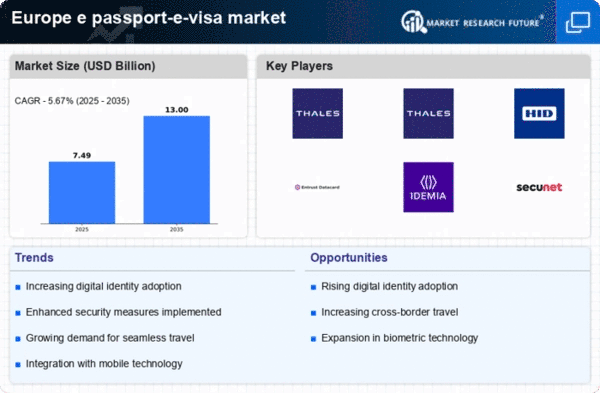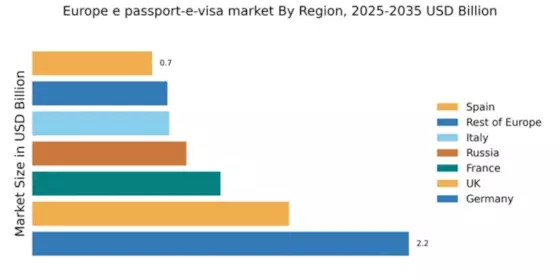Germany : Strong Market Growth and Innovation
Germany holds a dominant market share of 2.2 in the e-passport and e-visa sector, driven by robust government initiatives and a focus on security. The demand for biometric passports is increasing, fueled by rising travel and immigration needs. Regulatory policies, such as the EU's Digital Identity initiative, are enhancing the adoption of secure travel documents. Additionally, Germany's advanced infrastructure supports the development of innovative solutions in this space.
UK : Innovation Amidst Regulatory Changes
The UK e-passport market, valued at 1.5, is experiencing significant growth due to increasing travel demands and technological advancements. The UK government has implemented new regulations to streamline visa processes, enhancing the attractiveness of e-visas. The rise in digital identity solutions is also contributing to market expansion, as consumers seek more secure travel options. The focus on cybersecurity is paramount in shaping future policies.
France : Balancing Security and Accessibility
With a market share of 1.1, France is enhancing its e-passport offerings through innovative technologies and user-friendly processes. The French government is actively promoting e-visas to boost tourism and business travel, supported by regulatory frameworks that prioritize security. Demand for biometric passports is on the rise, driven by increased international travel and the need for secure identification.
Russia : Emerging Market with Unique Challenges
Russia's e-passport market, valued at 0.9, is gradually expanding as the government invests in digital identity solutions. Key growth drivers include increasing international travel and a push for modernization in public services. However, regulatory challenges and geopolitical factors may hinder rapid adoption. The focus on enhancing border security is also influencing market dynamics, with a growing emphasis on biometric technologies.
Italy : Cultural Heritage Meets Modern Security
Italy's e-passport market, valued at 0.8, is characterized by a blend of cultural heritage and modern security needs. The Italian government is promoting e-visas to facilitate tourism, supported by regulatory initiatives aimed at enhancing travel security. Demand for biometric passports is increasing, driven by the need for secure identification in a globalized world, particularly in cities like Rome and Milan.
Spain : Tourism-Driven Demand for Security
Spain's e-passport market, valued at 0.7, is heavily influenced by its thriving tourism sector. The Spanish government is implementing policies to streamline visa processes, enhancing the appeal of e-visas. The demand for secure travel documents is rising, driven by increased international travel. Major cities like Barcelona and Madrid are key markets, with a competitive landscape featuring local and international players.
Rest of Europe : Varied Markets with Unique Needs
The Rest of Europe, with a market share of 0.79, presents diverse opportunities in the e-passport sector. Different countries are at various stages of adopting e-passport technologies, influenced by local regulations and travel demands. The competitive landscape includes both established players and emerging local firms. The focus on enhancing border security and facilitating travel is driving innovation across the region.

















